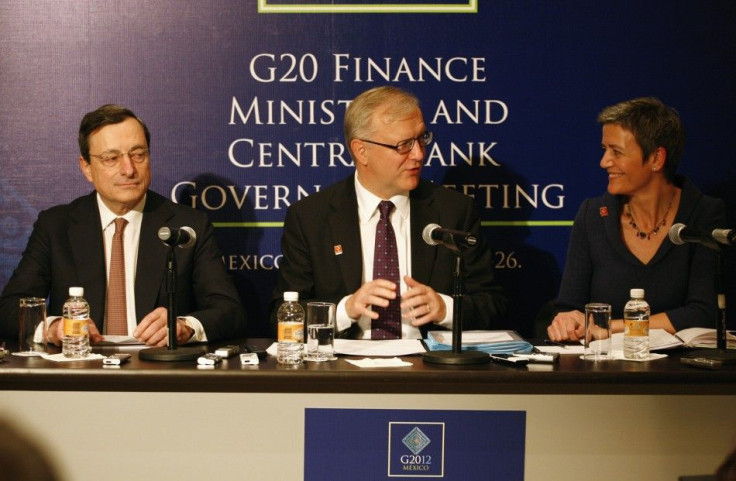G-20 to Europe: Show Us the Money

(Reuters) - Leading economies told Europe it must put up extra money to fight its debt crisis if it wants more help from the rest of the world, piling pressure on Germany to drop its opposition to a bigger European bailout fund.
Euro zone countries pledged on Sunday, at a meeting of finance leaders from the Group of 20 economic powers, to reassess next month the strength of their bailout fund.
This would be essential input when it comes for the G20 countries to consider putting more money into the International Monetary Fund's crisis war chest, G20 finance ministers and central bankers said in their final communiqué after two days of meetings here.
There is broad agreement that the IMF cannot substitute for the absence of a stronger European firewall and the IMF cannot move forward without more clarity on Europe's own plans, U.S. Treasury Secretary Timothy Geithner said.
Germany, as Europe's largest economy, has sent conflicting signals over whether it is ready to soften its position, and it came under intense pressure this weekend to support enlarging the region's war chest.
It faces political hurdles at home. German lawmakers, who vote on Monday on a second Greek bailout package, have argued that imposing fiscal discipline on indebted countries is far more important to regaining the confidence of markets and reviving economic growth than bigger rescue funds.
Geithner disagreed. While Europe's actions so far have reduced the risks of a catastrophic financial crisis, more must be done, he said.
British finance minister George Osborne was even sharper.
We have to see the color of the euro zone's money first - and, quite frankly, that hasn't happened. Until it does, there's no question of extra IMF money from Britain or probably anyone else, he said.
The G20 is racing to line up massive international resources worth nearly $2 trillion - including existing and new funds - possibly by late April. That would help to draw a line under the financial crisis that erupted in 2008 when Lehman Brothers collapsed, spawned the deepest U.S. recession since the 1930s and now has engulfed Europe's deeply indebted countries.
It would mark their boldest move since they ploughed $1 trillion into their economies three years ago to combat recession. Many advanced economies are still flooding markets with cheap money to fuel growth and prevent financial contagion.
STRONG FIREWALL
Yet the world economic recovery remains patchy and risks are still high that it could stumble, the G20 finance officials said in their communiqué.
They also noted risks to growth from rising oil prices, which vaulted to a nearly 10-month high above $125 a barrel on Friday. The G20 welcomed pledges by oil producers to ensure adequate supply.
A larger firewall would better equip officials to contain financial turbulence that could return, Olli Rehn, European Commissioner for Economic and Monetary Affairs, said.
We should not delay this further since one of the crucial lessons of this crisis has been that ... the longer we wait the more costly it tends to get, he said.
Germany's Finance Minister Wolfgang Schaeuble promised to make a decision some time in March.
The proposal is to merge Europe's temporary and permanent bailout funds to create a 750 billion euro ($1 trillion) war chest. This would open the door for other G20 countries, like Japan andChina, to meet the IMF's request for $500-$600 billion in new resources, on top of its current $385 billion in funds.
Put together, this would total almost $2 trillion in firepower. The G20 finance chiefs next meet in Washington in late April, where they plan to discuss extra IMF funds.
GERMANY ISOLATED
Germany's Schaeuble said there were no diverging views on the best path forward to stabilise Europe, and behind closed doors he appeared conciliatory. Margrethe Vestager, economy minister of current EU president Denmark, said on Saturday that even Germany was reasonably happy to strengthen the bailout fund.
But then Germany fought in vain for weaker language in the G20 communiqué, wanting to say that re-assessing Europe's financial firepower was important for getting more IMF funds, not essential as was finally agreed upon, G20 officials said.
And from Berlin, a government official close to Chancellor Angela Merkel insisted on Sunday there is already enough money pledged for the euro-zone's rescue fund.
The United States and some emerging countries struggled to understand Germany's position, another G20 official said.
They find it difficult to understand the German obsession with fiscal discipline, so Germans were a bit isolated in the meeting and putting the blame on Merkel and on the Bundestag was a way for the German delegation to fight the criticism coming from non-EU countries, one G20 official said.
Lawmakers in the Bundestag lower house were expected to approve the second Greek bailout with opposition support when it comes for a vote on Monday.
IMF REFORMS
Some developing economies have conditions of their own for giving more money to the IMF. Brazil's finance minister said that, on top of a bigger European rescue vehicle, emerging economies would want implementation of a 2010 reform giving them more say at the Fund
In another sign of emerging economies trying to flex their muscles, they said they might put up their own candidate for the soon-to-be-open job running the World Bank which is traditionally goes to the United States.
In the communiqué, the G20 reaffirmed it would stick to its pledge for IMF reforms by an annual IMF meeting in September.
© Copyright Thomson Reuters 2024. All rights reserved.





















